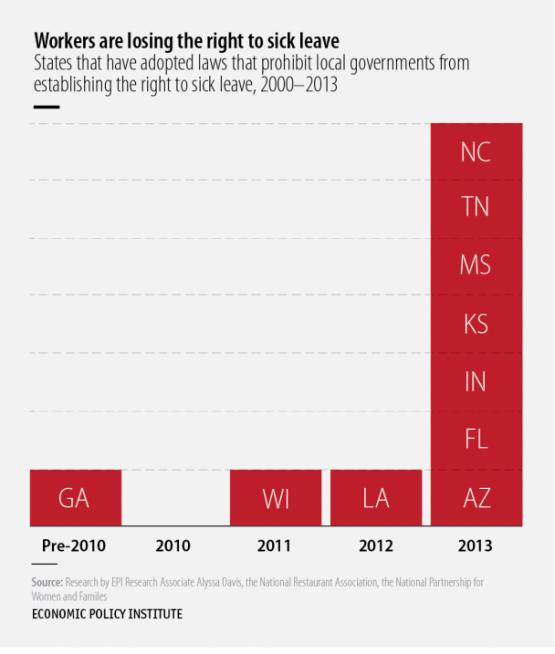This post originally appeared at ThinkProgress.
Ten states — Arizona, Florida, Georgia, Indiana, Kansas, Louisiana, Mississippi, North Carolina, Tennessee, and Wisconsin — have passed preemption laws that ban all cities and counties from enacting paid sick days bills, according to an analysis from the Economic Policy Institute.
As can be seen from the chart, momentum has picked up recently, with seven of those laws passed this year alone. They have also been introduced in at least 14 state legislatures, and Pennsylvania is currently considering one that was introduced in October.
Big business has been helping to fuel this tide of legislation. As the report notes, “In each of the ten states, the bills’ sponsors included members of the American Legislative Exchange Council (ALEC). And in each case, the bills were adopted following vigorous advocacy by corporate lobbies such as the Chamber of Commerce, National Federation of Independent Business, and Restaurant Association.”
Yet even though these business opponents claim that paid sick days would create unbearable costs, the evidence from those places that do have paid sick leave shows that they can be beneficial. Business growth and job growth have been strong under Seattle’s law. Job growth has also been strong in San Francisco and its law enjoys strong business support. The policies in Washington, DC and Connecticut have come at little cost for businesses. In fact, expanding DC’s current law would net employers $2 million in savings even with potential costs factored in. On the other hand, the average employer loses $225 per worker each year thanks to lost productivity when they get sick and can’t take paid leave.
And as the momentum grows for preemption bills, so too does the push for paid sick days. Six cities and Connecticut have them on the books, and fights are underway in Newark, NJ; Tacoma, WA; Massachusetts; New Jersey; and Vermont.



